What is Bitcoin and How Does It Work?
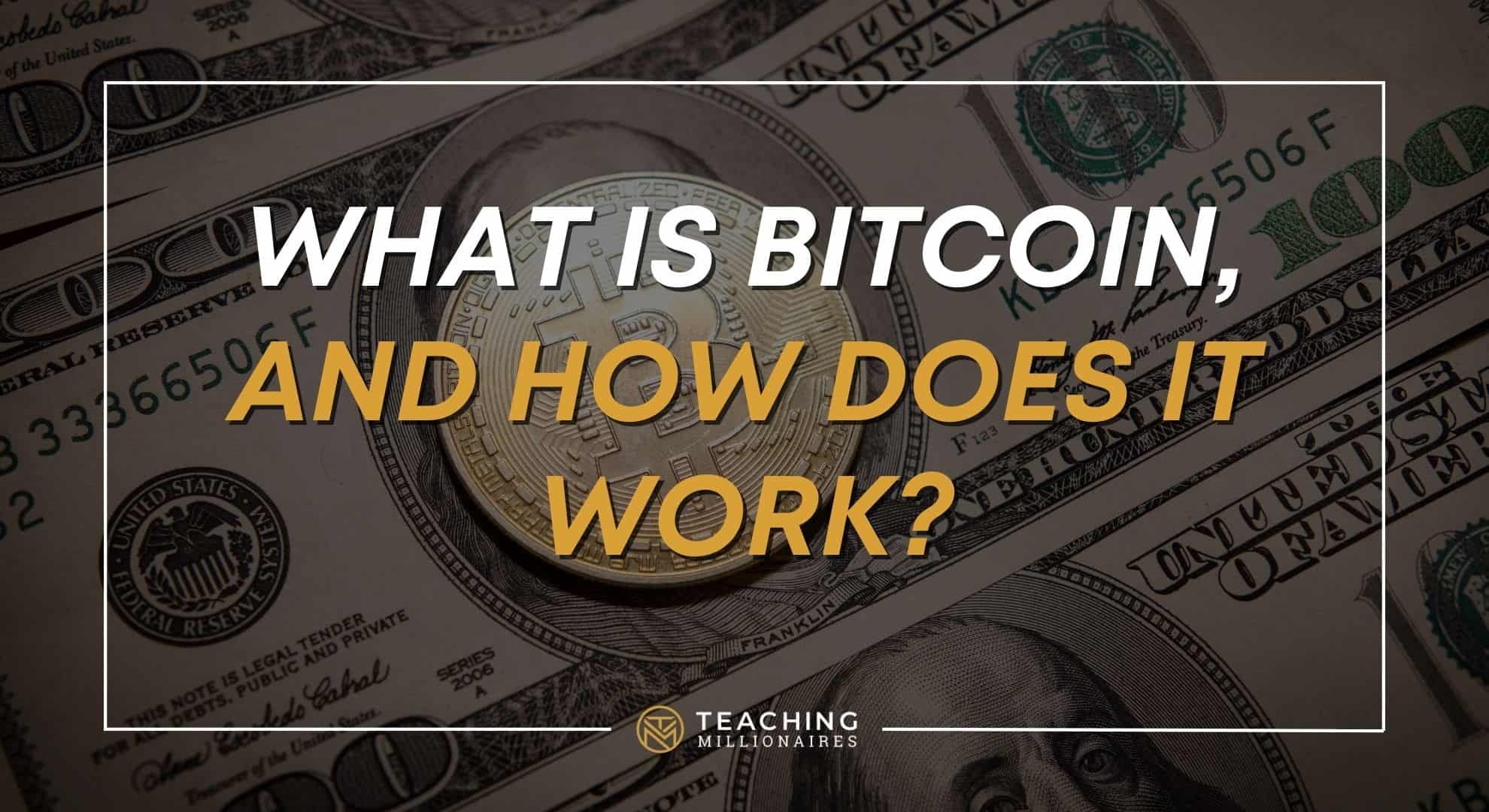
Here’s an overview explaining what is Bitcoin and how does it work – along with a breakdown of what apps you can use to buy cryptocurrency.
“TeachingMillionaires.com has partnered with CardRatings for our coverage of credit card products. TeachingMillionaires.com and CardRatings may receive a commission from card issuers. Opinions, reviews, analyses & recommendations are the author’s alone, and have not been reviewed, endorsed or approved by any of these entities.”
Is Bitcoin Real Money?
Bitcoin has been in the news lately because prices have skyrocketed. Major companies like PayPal are investing. Even the Queen of England seems interested in Bitcoin.

You’re not crazy for being curious about Bitcoin. However, investing is risky, and Bitcoin is not the first step you should take when it comes to investing. Take care of paying down debt and saving for retirement before you consider cryptocurrency investing.
Bitcoin is digital currency. It’s an asset you can hold as an investment that has value. For example, the cash in your wallet has value, but there’s always a middleman.
Banks charge fees if you spend more than your account balance. Credit card companies charge your business a fee every time someone swipes their card. Bitcoin removes the middleman.
Another way to think about Bitcoin is as a digital cash system that works peer-to-peer. I can pay you digitally and you can pay me, but it’s all done online instantly. They call this decentralized currency because no one country or organization controls the money.
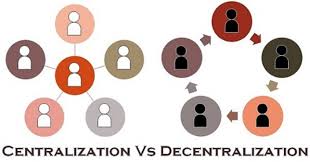
So, yes, Bitcoin is real money in the form of cryptocurrency.
What is Cryptocurrency?
Many of us don’t realize our money is not actually backed by gold anymore. In fact, President Nixon in the 1970s took the US dollar off the gold standard. The term money printing means that the US dollar can simply be printed by the Department of the Treasury, and this causes inflation over time.
When the internet was brand new, people didn’t understand how to send an email. Same thing when smartphones were new. People couldn’t understand the concept of apps and how you could store information in the cloud.
The internet changed the way we communicate with the world. Bitcoin changes the way we interact with money online.
What Public Companies Invest in Bitcoin?
Larger companies and institutions are buying massive quantities of Bitcoin because they want in on the cryptocurrency boom. Soon, Bitcoin will be integrated more places where you can buy things with it. For example, Mr. Shark Tank himself, Mark Cuban, has offered a 25% discount at Dallas Mavericks games if you want to pay with Bitcoin.
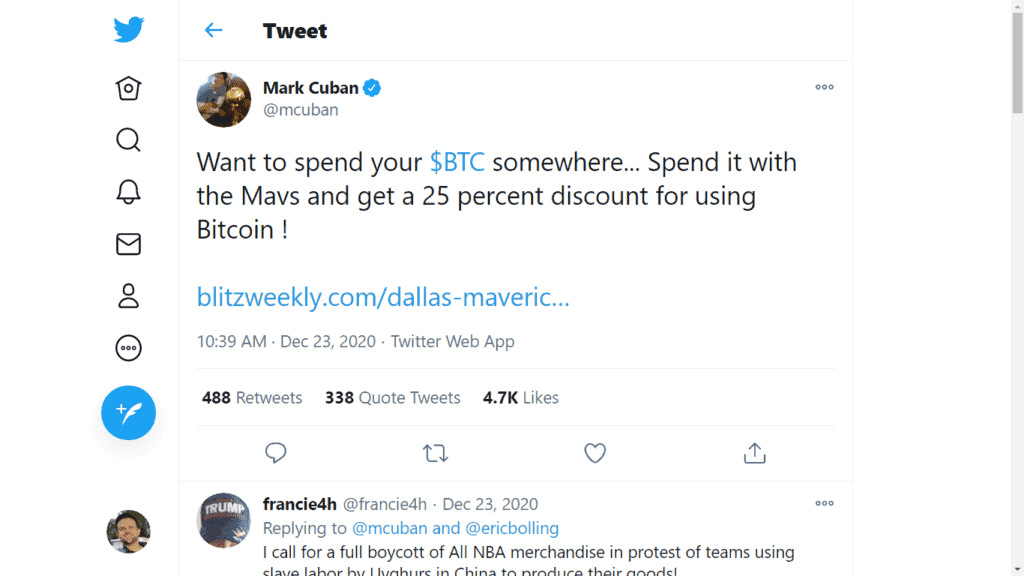
PayPal is one of the largest companies to invest in Bitcoin, and they have sellers and merchants all over the world. As soon as PayPal integrates Bitcoin as an accepted form of payment on its platform, you’ll see mass adoption from the general public.
What is the Best Way to Buy Bitcoin?
If you want to dip your toe in the Bitcoin waters, I’m about to give you five apps that let you buy Bitcoin right on your phone. Most offer something for free when you sign up. I’ll also talk about the fees associated with each of these apps.
I’m planning a follow-up on How to Buy Bitcoin Step-by-Step. Specifically, I plan to discuss two exchanges—one called Coinbase and the other called Gemini. These sites are a little advanced for today’s discussion, but they allow you to take your crypto off the exchange and put it on something called a hardware wallet—a Ledger.
Let’s save those topics for later. Here are the five apps that let you buy Bitcoin on your phone.
#5 – Robinhood
Robinhood is an investment app where you can buy and sell stocks and cryptocurrencies. On the surface, Robinhood is very attractive because it has no fee trading of crypto, and when you sign up, they give you one free stock just for opening an account.
However, I personally do not trust Robinhood with my money. Countless times when the market has gone up or down, those large swings cause Robinhood to crash and lock out their buyers and sellers.
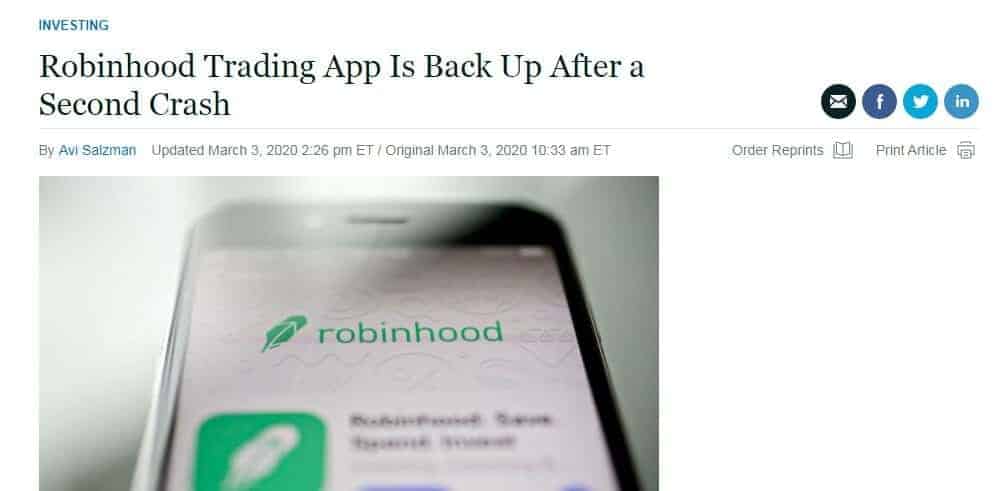
Another knock on Robinhood is that you don’t own the Bitcoin you buy. Rather, Robinhood holds it, and you are unable to withdraw it from them.
My suggestion is to open an account, get the free stock, then buy that same amount in Bitcoin. Watch it for a few weeks or months and see if you have the taste for more.
#4 – Cash App
I really want to like the Cash App more. It’s owned by Square, and I have stock in the company. I love Square; however, the Cash App has hidden fees. For example, if you go to their fee page for buying cryptocurrency, they don’t specifically spell out how much they charge in terms of a percentage or a spread.

As a result, I don’t trust buying with them. Still, they offer $5 when you sign up and send $5. You can look at it like $5 free Bitcoin. Also, the Cash App will allow you to withdraw the money onto your hardware wallet, so they are worth checking out for yourself.
#3 – PayPal
PayPal is a company in the S&P 500. They’re one of the first major corporations to have crypto on their balance sheet. Nearly 300 million people already have a PayPal account. They could become a market leader in cryptocurrency very soon.
Their fees for buying Bitcoin are low to get started—only 50 cents in fees for buying any amount up to $25. However, above $25 their fees can be over 2%. That’s too high for me, and they do not offer anything for free when you sign up or join for the first time. Also, you can’t withdraw your cryptocurrencies similar to Robinhood.
#2 – Webull
Webull has very low fees in terms of a small spread for buying and selling cryptocurrency—currently 1%. Unfortunately, they are not available in all states. For example, they don’t offer crypto trading here in my home state of New York.
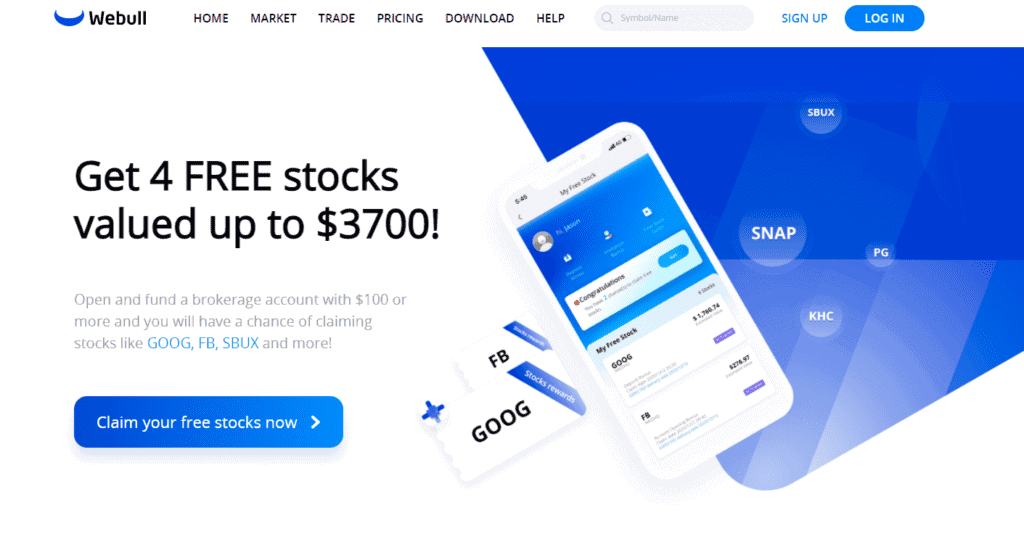
The reason I have them so high on my list is Webull offers free stocks when you sign up and deposit $100. Right now, those four free stocks are valued anywhere from $2.50 all the way up to $2,500. Their promotions change frequently, so check here for the most up-to-date offer.
My suggestion for Webull is to open an account and get your free stocks. Then, invest that same amount in Bitcoin.
Webull is by far the leader in generosity in terms of giving out free stocks. By adding the ability to buy Bitcoin, they’re positioning themselves to become the leader in investment apps very soon. Again, you cannot withdraw your Bitcoin with Webull—similar to PayPal and Robinhood.
#1 – SoFi Money
SoFi Money is a free bank account that give you $50 when deposit $500. It works the same as a checking account. Their app is phenomenal and integrates banking, investing in stocks, and buying cryptocurrency.
I really like the idea of getting free hard money for opening up a free account. Once that free $50 is in your account, then you can buy $50 in free Bitcoin.
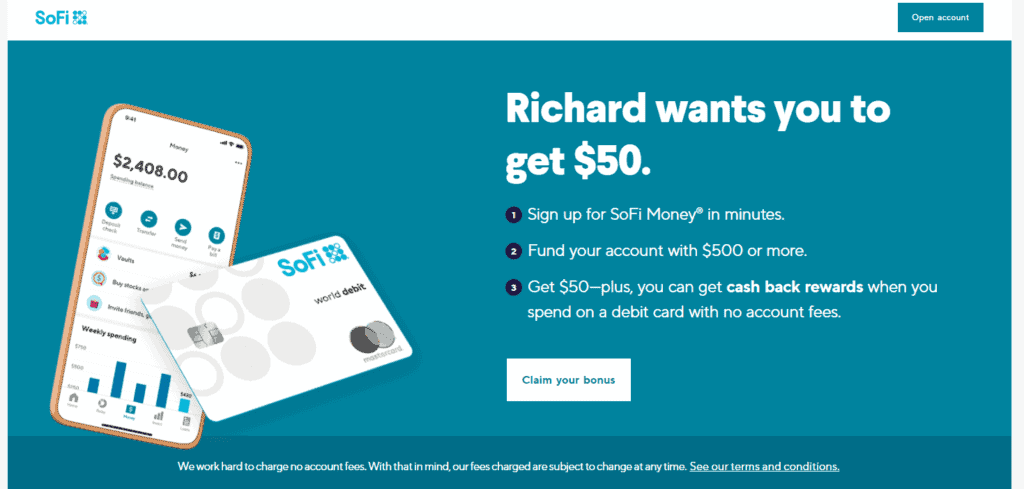
SoFi has competitive fees in the range of 1.25-1.5% for buying Bitcoin. Like all the other apps I mentioned besides the Cash App, you store your Bitcoin with SoFi. They don’t offer the ability to withdraw it at this time.
Quick Recap
Bitcoin is an asset. It is a store of value. Many call it digital gold.
Even though Bitcoin’s difficult to explain or understand, many people are taking advantage of dabbling with investing in it. The apps I mentioned above offer you the ability to sign up and get something for free.
If you want to invest in Bitcoin, try it in moderation and see if it’s something you want to pursue more in the future. It can be extremely volatile. I suggestion only investing a small portion of your net worth or play money.
We still need to discuss and explain what is a Ledger—also known as a hardware wallet. These allow you to buy Bitcoin, withdraw it, then store is safely in your own possession.
As always, I’m Rich and until next time.
Listen to Teacher Millionaires Podcast
“TeachingMillionaires.com has partnered with CardRatings for our coverage of credit card products. TeachingMillionaires.com and CardRatings may receive a commission from card issuers. Opinions, reviews, analyses & recommendations are the author’s alone, and have not been reviewed, endorsed or approved by any of these entities. Responses are not provided or commissioned by the bank advertiser. Responses have not been reviewed, approved or otherwise endorsed by the bank advertiser. It is not the bank advertiser’s responsibility to ensure all posts and/or questions are answered. I am not a financial advisor. The information I share is for educational purposes only and shouldn’t be considered as certified financial or legal advice. It is imperative you conduct your own research. I am sharing my opinion only.”






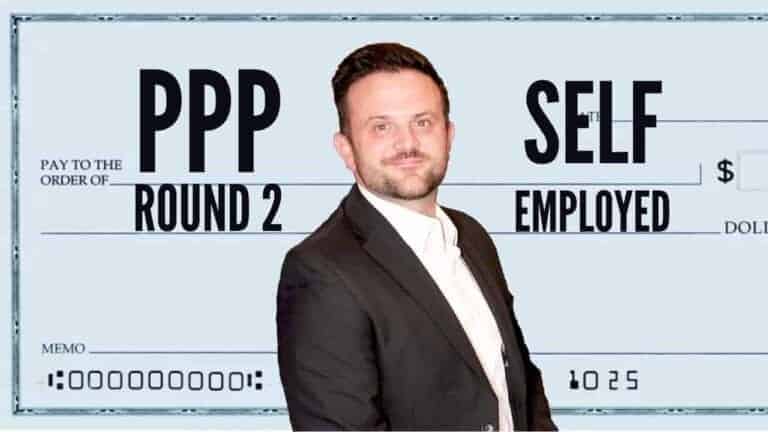
4 Comments